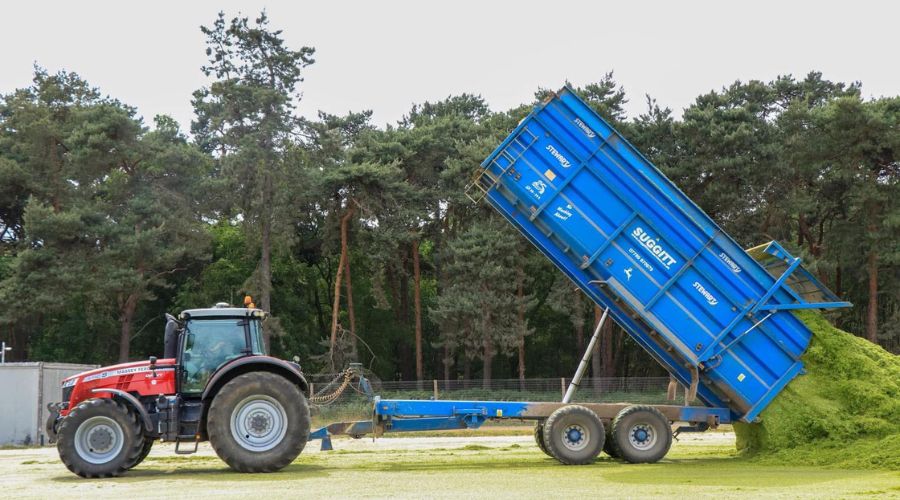Top tips to keep yourself and others safe this harvest
11th April 2025
Tilly Pass provides guidance on health and safety this harvest, including checks on kit, visibility on the road and towing safety.

During agriculture’s most difficult time, it’s more important than ever to protect yourself and your investment heading into harvest – our busiest and most dangerous time of the year.
Tilly Pass has provided the following plan of action to help ensure safety:
- Proof of maintenance and risk assessment paperwork
- Daily checks correctly recorded by trained operators
- Sheeting bulk and strapping flatbeds – understanding your 18in ullage
- Flashing beacons and lights
- Understanding your trailer speed and weight limits.
Regular checks on kit
Good preparation leads to an efficient and professional business. Proving that your kit has been serviced at suitable intervals by a qualified and competent person, and each time exceptional circumstances occur that are likely to jeopardise the safety of your work equipment, is vital.
Not only is this the legal requirement and helps fulfil your ‘duty of care’, but it is critical in lowering the mounting deaths and life-changing injuries within our industry.
Risks should be assessed daily by a person who has the appropriate qualifications, experience and with the knowledge of the risks that come with the task at hand.
It should be remembered that with change of circumstances like the weather, road conditions and the load being carried, that the assessment should be updated accordingly.
Daily and periodic checks on your kit must be performed by the operator who has had suitable instruction, using only the relevant manufacturer’s checks.
These should include frequent checks of the condition of the towing eye. This should not be excessively worn, twisted, misshapen or repaired.
The Tilly Pass towing eye measuring gauge is a good guide to the minimum wear on a towing eye.
Daily checks can be accessed for free on the Head to Tow app.
Road visibility
Visibility on the road is important to make other drivers aware of your presence, especially during the busy season and with bright lights and shadows obscuring vehicles and gateways.
Turning onto the road with front weights and bale chutes should be a particular concern, as these protruding have led to catastrophic crashes. Side marker lights and reflective tape are easily available and increase visibility and awareness for all road users.
When using an amber flashing beacon, it should be visible for 360 degrees in a horizontal plane. Many trailers have an amber flashing beacon, which should be used in the case of silage carting particularly when silage sides obscure the tractor beacon.
READ MORE: Somerset ‘hero’ farmer rescues 12 two-day-old piglets from fire
Load safety
When using bulk trailers, it is important to prevent loads from bouncing or blowing out which can leave debris on the road, and should in most cases be sheeted.
In the case of silage with added sides, an 18-inch ullage – or gap between the load and top of the trailer – is required. If excessive blowout is causing restricted vision for other road users, then this should be considered as part of your risk assessment.
When strapping a load onto a flatbed trailer, correctly rated lashing straps in good condition should be used rather than ropes. Straps should not be frayed or worn, and should be sufficiently rated to the weight of the load.
Trailer combinations are governed to tow at 20 or 25mph depending on the trailer braking system. Fastracs and Unimogs with a sprung rear axle may tow at 25mph only if the trailer is fitted with a full commercial braking system.
Load weights must include the weight of the trailer and the knowledge of this should be part of your risk assessment.
An overall weight of 31 tonnes is the maximum and no part should be overloaded. Travelling as a combination means that the machine is at all times limited to the reduced speed of the trailer.
If a secondary braking device is fitted onto a trailer such as a Powerbrake, this should be attached to the tractor to stop the trailer in a breakaway event, and in the case of lightweight towing your breakaway cable should be in good repair and attached to the vehicle – not to the towing hitch.
By being a responsible, prepared employer, you can reduce the amount of near-misses and incidents resulting in death or life-changing injury.
Preparation can also reduce the amount of costly mid-harvest breakdowns, protect your machinery investments, increase your staff efficiency and reduce the pressures on you and your family – improving your mental wellbeing.
READ MORE: Animal feed company fined over 560k after employee lost arm
Read more farm safety news.
